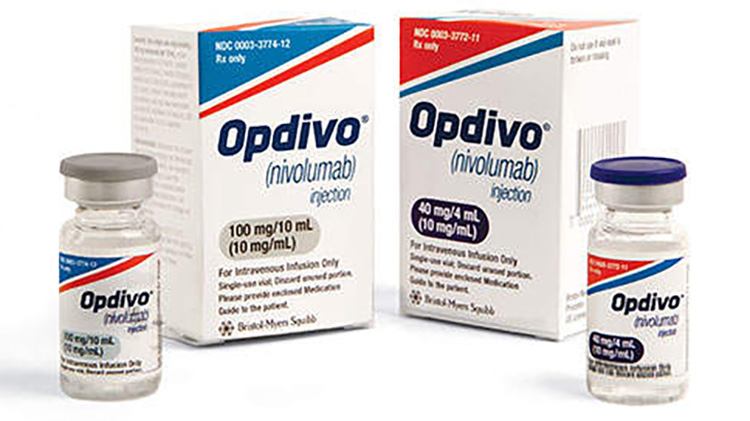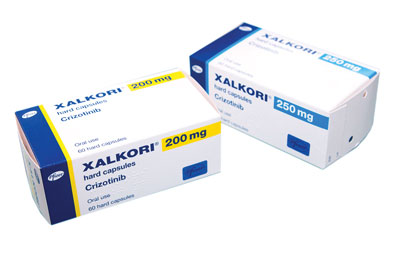Opdivo (Nivolumab) vs Xalkori (crizotinib)
Opdivo (Nivolumab) vs Xalkori (crizotinib)
Opdivo (nivolumab) is an immune checkpoint inhibitor that works by blocking the PD-1 protein on T cells, enhancing the immune system's ability to attack cancer cells, and is typically used for a variety of cancers including melanoma, lung cancer, and kidney cancer. Xalkori (crizotinib) is a targeted therapy that specifically inhibits the anaplastic lymphoma kinase (ALK) and ROS1 receptors in non-small cell lung cancer (NSCLC) cells with these specific genetic alterations, leading to tumor shrinkage. The choice between Opdivo and Xalkori would largely depend on the specific genetic characteristics of the patient's cancer, as Xalkori is only effective in cancers with ALK or ROS1 mutations, while Opdivo has a broader range of indications but requires a functioning immune system to be effective.
Difference between Opdivo and Xalkori
| Metric | Opdivo (Nivolumab) | Xalkori (crizotinib) |
|---|---|---|
| Generic name | Nivolumab | Crizotinib |
| Indications | Various types of cancers including melanoma, lung cancer, renal cell carcinoma, Hodgkin lymphoma, and others | Non-small cell lung cancer (NSCLC), ROS1-positive NSCLC, and ALK-positive metastatic NSCLC |
| Mechanism of action | Programmed death receptor-1 (PD-1) blocking antibody | Anaplastic lymphoma kinase (ALK) and ROS1 inhibitor |
| Brand names | Opdivo | Xalkori |
| Administrative route | Intravenous infusion | Oral |
| Side effects | Fatigue, rash, musculoskeletal pain, pruritus, diarrhea, nausea, and others | Visual disorders, gastrointestinal effects, edema, elevated transaminases, and others |
| Contraindications | Severe hypersensitivity to nivolumab or any of its excipients | Hepatic impairment, concomitant use with strong CYP3A inhibitors or inducers |
| Drug class | Immune checkpoint inhibitor | Tyrosine kinase inhibitor |
| Manufacturer | Bristol Myers Squibb | Pfizer |
Efficacy
Overview of Opdivo (Nivolumab) in Lung Cancer Treatment
Opdivo, also known as Nivolumab, is an immunotherapy drug that has been approved for the treatment of certain types of lung cancer, including non-small cell lung cancer (NSCLC) after prior chemotherapy, and as a first-line treatment when combined with other therapies. It is a programmed death-1 (PD-1) inhibitor that works by enhancing the body's immune response against cancer cells. Clinical trials have demonstrated that Opdivo can significantly improve overall survival in patients with advanced NSCLC compared to chemotherapy alone. The efficacy of Opdivo has been observed in various subtypes of NSCLC, including those with high PD-L1 expression, where it has shown a greater benefit.
Xalkori (Crizotinib) and its Role in Lung Cancer
Xalkori, known generically as crizotinib, is a targeted therapy specifically indicated for the treatment of NSCLC patients whose tumors are anaplastic lymphoma kinase (ALK)-positive, as detected by an FDA-approved test. Crizotinib is a tyrosine kinase inhibitor that blocks the activity of the ALK protein, which can promote the growth of cancer cells. In clinical studies, Xalkori has been shown to be effective in shrinking tumors and prolonging progression-free survival in patients with ALK-positive NSCLC. The response rates to crizotinib in these patients are significantly higher compared to standard chemotherapy regimens.
Comparative Efficacy in Lung Cancer Management
When comparing the efficacy of Opdivo and Xalkori, it is important to consider the specific patient populations for which these drugs are indicated. Opdivo is used more broadly in NSCLC patients, including those with squamous and non-squamous histologies, and its efficacy is not dependent on the presence of specific genetic mutations. On the other hand, Xalkori is tailored for a subset of NSCLC patients with ALK rearrangements, a smaller but well-defined group. Both medications have altered the landscape of lung cancer treatment, offering improved outcomes for patients with advanced disease.
Considerations for Optimal Use in Clinical Practice
In clinical practice, the choice between Opdivo and Xalkori for lung cancer treatment is guided by tumor histology and genetic testing. For patients with ALK-positive NSCLC, Xalkori is a preferred first-line treatment option. For those without ALK rearrangements, Opdivo may be considered, especially after other treatments have failed. It is essential for healthcare providers to conduct appropriate biomarker testing to identify suitable candidates for each therapy, ensuring the most effective treatment plan is selected for each patient with lung cancer.
Regulatory Agency Approvals
Opdivo
-
European Medical Agency (EMA), European Union

-
Food and Drug Administration (FDA), USA

-
Health Canada

-
Pharmaceuticals and Medical Devices Agency (PMDA), Japan

-
Therapeutic Goods Administration (TGA), Australia

-
Medsafe (NZ)

Xalkori
-
European Medical Agency (EMA), European Union

-
Food and Drug Administration (FDA), USA

-
Health Canada

-
Pharmaceuticals and Medical Devices Agency (PMDA), Japan

-
Therapeutic Goods Administration (TGA), Australia

Access Opdivo or Xalkori today
If Opdivo or Xalkori are not approved or available in your country (e.g. due to supply issues), you can access them via Everyone.org.
How it works

Make an enquiry
Choose the medicine you want to buy, answer a couple of questions, and upload your prescription to speed things up. We’ll get back to you within 24 hours.


Make an enquiry
Choose the medicine you want to buy, answer a couple of questions, and upload your prescription to speed things up. We’ll get back to you within 24 hours.


Breeze through the paperwork
We'll guide you through the required documents for importing unapproved medicine, ensuring you have all the necessary information.


Get a personalized quote
We’ll prepare a quote for you, including medicine costs and any shipping, administrative, or import fees that may apply.


Receive your medicine
Accept the quote and we’ll handle the rest - sourcing and safely delivering your medicine.

Some text on this page has been automatically generated. Speak to your physician before you start a new treatment or medication.
Let's talk
If you have any questions, call us or send us a message through WhatsApp or email:
Contact us




